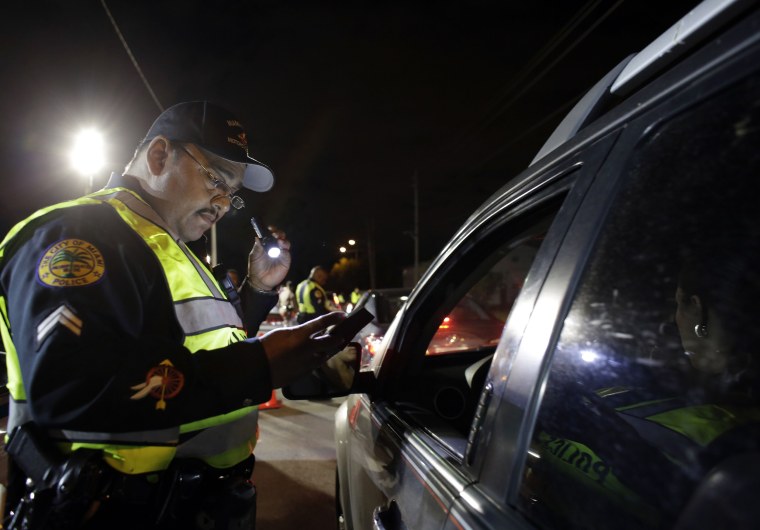Nothing is less romantic than a booty call, but let's face it, they're usually a part of dating life. And sometimes, you're not exactly in the most mentally clear state when you heed (or make) that call of passion. Hey, no judgments there, but come on, don't drive drunk to get to your hook-up destination!
A recent report from CheapCarInsurance.Net shows that a hook-up location is one of the top destinations for inebriated drivers, with 26 percent of respondents claiming they've driven drunk to get to one.
"It might not seem like a huge percentage of respondents, but it did rank among the top five destinations identified by respondents as to where they were headed when driving drunk," said Angela Skane, project manager for CheapCarInsurance.net.
Ninety-four percent of respondents said they've driven drunk to get home, and 39 percent said they've driven drunk to get to a friends house. Twenty-five percent claimed that they've gotten behind the wheel when drunk to drive to yet another bar, while 17 percent admitted to driving drunk to reach a liquor store.
Who are these people behaving so foolishly? Certainly it's not the millennials. They have undoubtedly learned from the mistakes of gen-Xers and boomers, and while they may still be grappling with the dangers of texting and driving, drinking and driving isn't a problem for them.
Wrong. At least according to this study.
Millennials Are a Big Part of the Problem
"Respondents ranged in age from 19 to 74, and 67.15 percent were millennials," said Skane.
Yikes! Millennials, what gives? You're supposed to do all things better than every other demographic! Alas, it looks as though millennials commonly suffer a gap in self-perception: They're drunk, but don't think they are.
"The millennials who took our survey were the group most likely to feel okay to drive, when according to their BAC estimate, they were actually over the legal limit," said Skane.
The report also found that drunk driving was more common over the weekend, with the BAC of men and women nearly doubling on Friday and Saturday when compared to weeknights. Here too, millennials appeared sloppier than any other age group.
"When looking at weekend BACs by age you can see that from the age ranges of 20 to 37, the BAC range is much broader, meaning that the BACs of those falling into this age range are higher than that of those who are over the age of 40," said Skane.
What About Ride-Sharing?
The average millennial (and just about anybody with a smartphone in an urban area) has come to know and love ride-sharing apps such as Lyft and Uber. CheapCarInsurance's study suggested that indeed, these services are helping curb instances of drunk driving.
According to the report, people do make use of these services when they're out drinking: Roughly 43 percent of men say they called for a ride, as did 38 percent of women. Close to 70 percent of men said that they used a ride-share service because a friend made them, while only 30 percent of women reported the same reason; 34 percent of women said they called a ride-share because they were too drunk to get to their destination, compared with 63 percent of men.
Ideally, we'd see these numbers at 100 percent for all respondents, but that isn't presently possible — not when there are still regions that have not yet allowed the presence of ride-sharing services.
Uber and Lyft Not Available in Some Regions
Sydney Ziverts, a millennial living in Syracuse, told NBC News that drunk driving among her peers is a huge problem, largely because Lyft and Uber are not available in central New York.
"We have a problem with the reliability of the limited cabs in our area on top of [them] being expensive," said Ziverts. "A ride-sharing service such as Uber or Lyft would quickly resolve both of these problems, eliminating a great deal of drunk driving."
And even if you can land/afford a cab, Ziverts says that people are reluctant to leave their cars at bars because they'll likely get towed.
"Signs have been placed in parking lots of popular bars saying they will tow your car if you park it overnight," said Ziverts. "On a millennial's salary, paying for your car to get towed sounds dreadful. People would rather take the risk and drive."
Ralph Blackman, president and CEO of Responsibility.org, a non-profit fighting drunk driving and underage drinking, is urging all municipalities to authorize ride-sharing services.
"Why wouldn't you give people, especially young people, the option of using [a ride-sharing service when drunk]? All communities need to take advantage of this."
Apps Can Help, to an Extent
As the study proves — in addition to heaps of other data such as that from The National Highway Traffic Safety Administration, the problem of drunk driving is alive and well in the U.S, and it's alarming to note that millennials are part of the problem.
Blackman is of the opinion that we just aren't doing enough to address the issue, and should focus practical efforts towards millennials. One thing he hopes will help is Responsibility.org's app, Virtual Bar, which allows users to enter in their gender, weight, and height, along with the type of alcoholic beverage they’re consuming and at what time.
"A lot of people don't know that [certain factors] like weight and height affect their BAC," said Blackman. "And learning by experience can have tragic results."
There are a number of other apps that help determine your blood alcohol level such as Intellidrink and DrinkTracker Breathalyzer, but none of them guarantee 100 percent accuracy, and you probably should just splurge on a cab, go for Lyft, or stay at home if you're going to be drinking. Easier said than done though, evidently.
"The results of this survey indicate just how often the act of drunk driving occurs, and how it still justifies public attention, despite the strides we’ve made as a nation thus far," said Skane.
